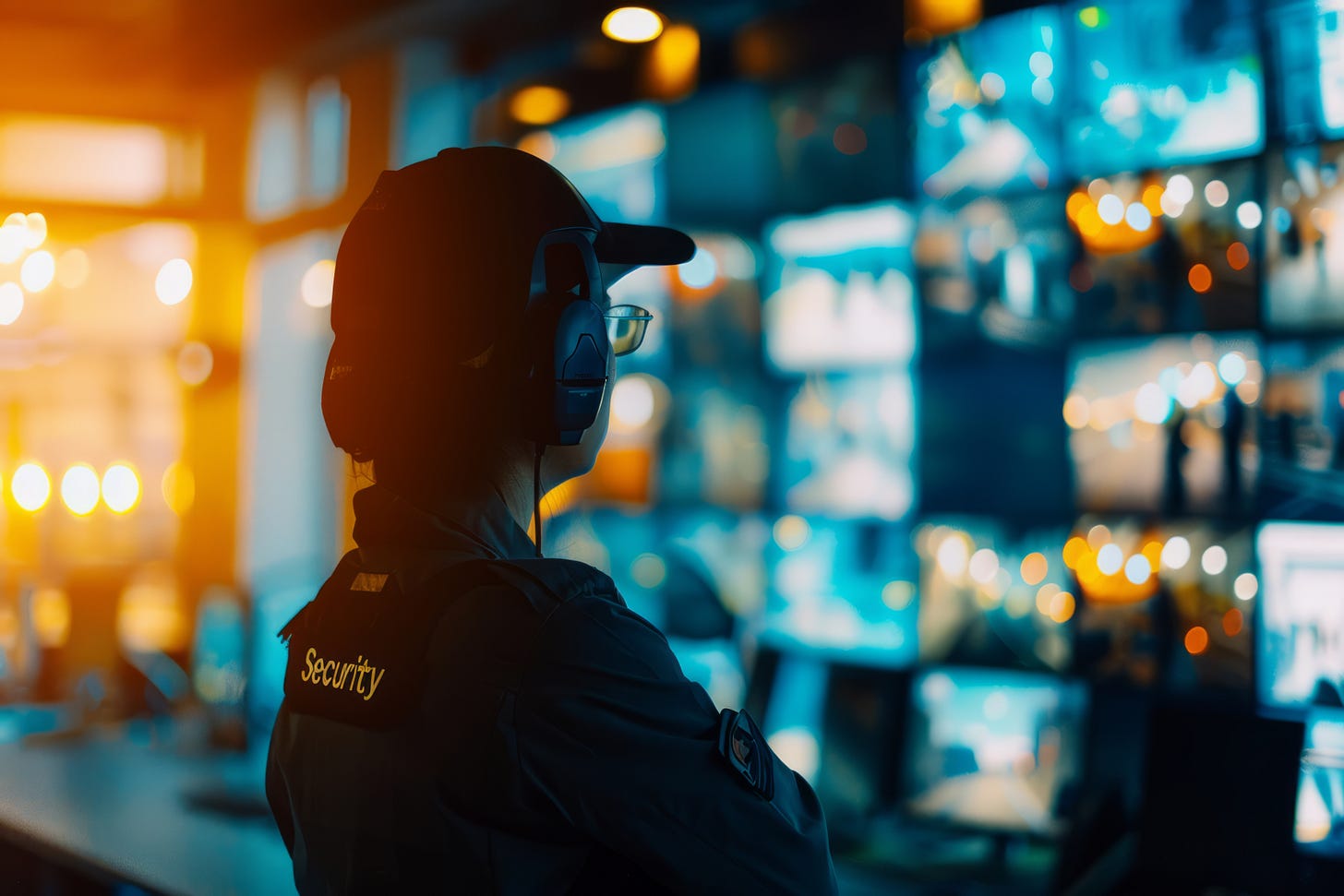Facial recognition is gaining ground | Press review n°20
I selected important news on artificial intelligence during the week of August 18 to 24, 2025. Here's my commentary.
Welcome to the twentieth press review of Artificial reality. This week I focused on facial recognition, mass surveillance, and digital sovereignty. Have a good read!
📰 Read
Facial recognition is gaining ground
Facial recognition, a surveillance and identification technology powered by artificial intelligence, is increasingly used worldwide and carries numerous risks, Le Monde reports.
This technology can, for example, allow law enforcement agencies or private surveillance firms to obtain the names of everyone who passes in front of a camera thanks to an automatic identification system that analyzes their faces.
“Whether it’s airports, transportation, border control, solving criminal cases and much more, facial recognition has become increasingly commonplace around the world,” explains journalist Marjorie Cessac. This market is worth $8 billion today and could rise to $18 billion by 2030.
Facial recognition technology will change the way we live (The Economist, 2017)
Facial recognition can be used for mass surveillance. Its deployment is widespread in China, where citizens are constantly monitored on the streets and are assigned points based on how well they obey the law. But it is also expanding in Western countries, for example in the United Kingdom, where it is increasingly being employed in supermarkets and nightclubs.
China: facial recognition and state control (The Economist, 2018)
There are safeguards regarding facial recognition in the European Union, such as the General Data Protection Regulation (GDPR) and the Artificial Intelligence Act (AI Act). The latter states that biometric identification systems, including facial recognition technology, pose unacceptable risks to individuals’ fundamental rights when they are deployed in public areas and operate in real‑time. However, national security or border control contexts are exempted, as in airports, for example.
“The AI Act partially regulates real-time facial recognition, but we can already see how its use can be problematic after the fact, when protesters are arrested days later. That’s what happened in Russia in 2021,” notes Katia Roux, advocacy officer at Amnesty International France.
Illegal use
Despite this legal framework, the Hungarian parliament authorized in March the use of facial recognition to identify participants in the Pride Parade, which is now prohibited by law. In November 2023, investigative outlet Disclose revealed that the French national police had illegally used a facial recognition software from Israeli company BriefCam for eight years, in the utmost secrecy.
“Companies like BriefCam continue to sell their algorithmic videosurveillance software to cities, and what was happening before the Olympic Games is now continuing with total impunity,” deplores Noémie Levain, lawyer at La Quadrature du Net. In January, the administrative court of Grenoble ruled in favor of this civil rights association in a case against the town of Moirans, in eastern France, recognizing the illegality of that videosurveillance software even though many municipalities were using it.
The French government does not intend to stop there. On May 23, Justice Minister Gérald Darmanin announced the launch of a working group on facial recognition, aiming to introduce it in public spaces and airports. The goal is to “create a legal framework” that would allow “the introduction of this measure into our legislation,” despite the current prohibition on identifying and tracking someone in real-time.
A few days earlier, he posted on his X account that, in his view, technology and facial recognition represent “the solutions to drastically fight insecurity” and that “unfortunately, Parliament has always opposed them until now.” “Once considered a red line, facial recognition is now embraced by members of the government even though the risks are well documented,” comments Katia Roux.
Wrongful arrests
Public‑law lecturer Caroline Lequesne served on the evaluation committee that oversaw the algorithmic videosurveillance experimentation during the 2024 Olympic and Paralympic Games in Paris. In an interview with Le Monde published Monday, she observes an intensifying lobby effort by industry and politicians to conduct more experiments with facial recognition.
Lequesne deplores that, legally, “the lines are interpreted in a questionable way” and that there is no broad civic debate on this controversial technology. According to her, “a narrative is rising that if you want security, you need facial recognition. This idea is gaining ground with the public.”
She argues that citizens need to be informed that “facial recognition doesn’t bring more security, however it’s very expensive and creates new risks.” She gives an example:
“Many people take refuge in the idea that they have nothing to hide. Yet artificial intelligence works by making deductions. It creates profiles that can categorize you in ways you probably never imagined. Perhaps, without knowing it, you look like a wanted person, or your gait and expressions don’t match the algorithm’s ‘norm.’ The public does not grasp the impact of errors that AI can make. In the United States, where these tools are highly developed, wrongful arrests remain frequent and traumatic for those affected.”
She also worries about deploying facial recognition in supermarkets or stadiums. “Its normalization would not be without consequences for our social cohesion: the end of anonymity also means the end of the conditions for democracy.”
Facial recognition also poses data protection risks. The highly sensitive biometric data recorded by such systems can become targets of cyberattacks. Criminals could then use that information to impersonate victims, for instance with deepfakes.
No nationwide ban in Switzerland
In Switzerland, some cities such as Lausanne and Zurich have banned facial recognition from public spaces, but there is currently no national law restricting it.
Geneva Airport now wishes to use the technology to screen passengers. Cameras installed at various checkpoints would analyze travelers’ faces and allow them to pass security gates or board their flights, according to a RTS report broadcast in April. The project is being shared with other Swiss airports, which will need explicit federal authorization and a revision of the aviation law that could come into effect by the end of 2026, at the earliest.
In February, Le Temps revealed that retailer Coop discreetly installed algorithmic videosurveillance cameras in several of its stores to detect theft at self‑checkout machines. These “smart” cameras do not perform facial recognition, but they could still identify customers based on biometric traits such as height, build, or gait. A further step toward mass surveillance powered by artificial intelligence.
Reconnaissance faciale, tous sous l’œil des caméras? (RTS, 2025)
Seven important news this week
Microsoft employees occupy headquarters in protest of Israel contracts (The Verge)
Real Footage Combined With AI Slop About DC Is Creating a Disinformation Mess on TikTok (404 Media)
Elon Musk’s xAI Published Hundreds Of Thousands Of Grok Chatbot Conversations (Forbes)
Google to provide Gemini AI tools to federal agencies for 47 cents (The Hill)
AI firm rolls out tool to detect nuclear weapons talk (The Hill)
Claude AI will end ‘persistently harmful or abusive user interactions’ (The Verge)
Read the other articles of the week I have selected by clicking here.
🎥 Watch
Mass surveillance is intensifying
In a video published on Friday, journalist Taylor Lorenz interviews Albert Fox Cahn, the founder of S.T.O.P., a New York based organization defending privacy.
The address several current topics, such as the new age verification measures on certain internet platforms, online surveillance, and facial recognition.
“We’re creating this authoritarian tracking system at a time when rule of law is crumbling.”
“It’s not just trying to think about ‘Is there something I want to hide?’. It’s ‘How do you live your life when you second-guess the impression you’re making on an outside observer with every decision you make?’. There’s a psychological tax to that type of lifestyle, where you’re walking down the street and you’re wondering ‘Oh, does the algorithm think I have a good micro-expression or a problematic one?’. Going into my front door ‘Oh, does the facial recognition have a log of me going out for groceries too often?’. You shouldn’t have to have that constant catalog of ideas running through the back of your head that this is how everything could be misunderstood.”
- Albert Fox Cahn
Landlords Are Using Facial Recognition to Raise Your Rent
Seven important videos this week
AI Bubble May Finally Be Popping (Breaking Points)
Musk's Self-Driving Tesla Claims Have Been Outright Falsehoods (Forbes)
Agentic AI - how bots came for our workflows and drudgery (Financial Times)
How AI is Pushing Tech Workers to Blue-Collar Jobs (Economy Media)
Sam Altman Despises Elon Musk. Now He Is Going After His Companies (Forbes)
The Insane Truth About OpenAI (MagnatesMedia)
From Asimo to Agibot: Asia's humanoid evolution (Bloomberg)
Watch the other videos of the week I have selected by clicking here.
🔈 Listen
The importance of digital sovereignty
In the new episode of Tech Won’t Save Us, journalist Paris Marx talks with Cecilia Rikap, an economics professor at University College London and Head of Research at the Institute for Innovation and Public Purpose.
Many countries around the world depend on U.S. tech companies. Paris Marx and Cecilia Rikap explain what risks this entails and why it’s important for states to develop their own digital sovereignty.
Listen to Tech Won’t Save Us on Youtube Music
Thank you for reading the twentieth press review of Artificial reality! Subscribe for free to receive the reviews directly into your mailbox. With a paid subscription, you will also have access to all articles and to an exclusive monthly newsletter.
Have a good week,
Arnaud





